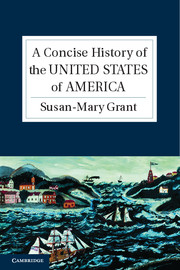Book contents
- Frontmatter
- Contents
- Figures
- Tables
- Acknowledgments
- Introduction
- 1 New Found Land
- 2 A City on a Hill
- 3 The Cause of All Mankind
- 4 Self-Evident Truths
- 5 The Last, Best Hope of Earth
- 6 Westward the Course of Empire
- 7 A Promised Land
- 8 The Soldier's Faith
- 9 Beyond the Last Frontier
- 10 A Land in Transition
- 11 Armies of the Night
- Notes
- Guide to Further Reading
- Biographies
- Index
11 - Armies of the Night
Counterculture and Counterrevolution
Published online by Cambridge University Press: 05 June 2012
- Frontmatter
- Contents
- Figures
- Tables
- Acknowledgments
- Introduction
- 1 New Found Land
- 2 A City on a Hill
- 3 The Cause of All Mankind
- 4 Self-Evident Truths
- 5 The Last, Best Hope of Earth
- 6 Westward the Course of Empire
- 7 A Promised Land
- 8 The Soldier's Faith
- 9 Beyond the Last Frontier
- 10 A Land in Transition
- 11 Armies of the Night
- Notes
- Guide to Further Reading
- Biographies
- Index
Summary
America – the land where a new kind of man was born from the idea that God was present in every man not only as compassion but as power, and so the country belonged to the people.
(Norman Mailer, The Armies of the Night, 1968)Lyndon B. Johnson, abruptly elevated into the Oval Office by the assassination of Kennedy at the end of 1963, had more than his predecessor's popularity to contend with; he had the legacy of more than half a century of liberalism to live up to. Virtually every president before him since Theodore Roosevelt had offered the nation a deal or the promise of a new start; Square Deal, Fair Deal, New Deal, New Freedom, and, in 1960, a New Frontier, “a frontier of unknown opportunities and perils – a frontier of unfulfilled hopes and threats,” as Kennedy had described it. There was, possibly, a limit to how many fresh starts any single nation could hope to sustain, especially one as new as the United States was in 1963. Yet Johnson had his own plan, one that would both incorporate and encapsulate all the promises that he had grown up with and through, one not grounded in the alleviation of national poverty but in the potential for attacking individual poverty that the nation's postwar prosperity provided, one that would finally fulfill the promise of the United States of America: the “Great Society.”
- Type
- Chapter
- Information
- A Concise History of the United States of America , pp. 346 - 380Publisher: Cambridge University PressPrint publication year: 2012

